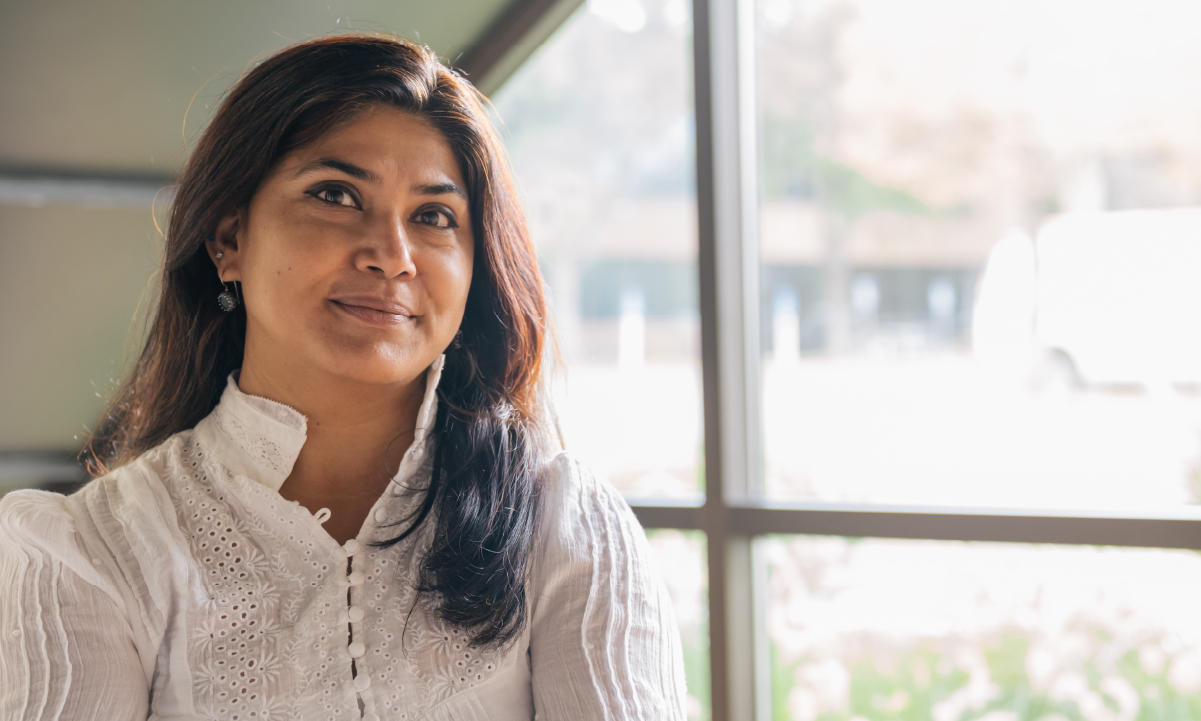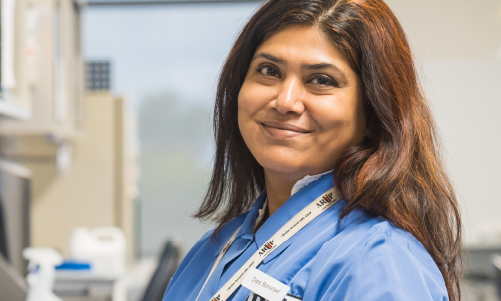
Dipanwita Banerjee, MS, joined ARUP in 2019 to follow her desired career path after more than 10 years away from the laboratory.
Dipanwita Banerjee, MS, has always had a passion for biology. Her father, a horticulturist, taught her from a young age to care for plants and study their biology. She had dreamed of being a scientist for years before starting her formal education in biology.
After earning her bachelor’s degree in plant biology years later, Banerjee took a long hiatus to travel the world and start a family.
“I just got married because I didn’t know what to do with my life yet,” she said. “After that, my husband and I traveled because we both loved traveling, and he had a job where he could work in different countries.”
Banerjee returned to her home country of India in 2013 after spending time in Singapore. She then decided to continue her education by pursuing a master’s degree in plant science from Savitribai Phule Pune University. She loved working in the lab and knew it was the right path for her. When she was offered a lecturer position at the university following her graduation, she declined the offer to move to the United States.

After moving to Los Angeles, Banerjee and her husband had two sons. At the time, Banerjee had a dependent visa, which enabled her to live in the U.S. but restricted her from working. Then, in 2014, she and her family moved to Utah, where she finalized her Employment Authorization Document (EAD) so she could start searching for work.
Despite her eagerness to return to the lab, Banerjee faced the daunting challenge of looking for work with an employment gap of more than 10 years. Even with a master’s degree and plenty of lab experience, she had trouble obtaining a position in her chosen field without recent work history.
She accepted a job testing water at a water treatment plant in 2016 but didn’t feel fulfilled—she wasn’t expected to think critically or apply any knowledge of biology in her role. She missed the lab environment and decided to search for a new job again after only one year.
Growing frustrated with the job search, she turned to the Biotechnology Department at Salt Lake Community College (SLCC) for help. She figured that if SLCC could connect her with internships, refresher courses, or even just lab space, it could be an inexpensive way to sharpen her lab skills and help her find a more fulfilling position.
Unfortunately, the counselor she spoke with at SLCC indicated that the school was unable to help, as they had nothing to offer an individual who already had a master’s degree.
Banerjee found herself in a catch-22. Her master’s degree made her overqualified for the training necessary to work in a lab but didn’t qualify her for full-time lab work. Out of desperation, she returned to SLCC for assistance. This time, the counselors agreed to help by connecting her to InnovaBio, a research lab that offers internship and volunteer opportunities to biotechnology students.
Her time at InnovaBio rekindled her passion for science, and she began to feel more confident applying for full-time roles in a laboratory. She volunteered in InnovaBio’s lab for six months.
One of Banerjee’s mentors at InnovaBio connected her with ARUP Laboratories, and that introduction landed her an interview. She was then offered a job in ARUP’s Research and Development (R&D) Immunology Lab. She would start as an entry-level technician but was determined to move up in the company.
Banerjee felt excited but apprehensive to begin working at ARUP after being out of the workforce for so long. Despite her fears, however, she quickly found ARUP to be a second home.
“The first day I sat in my cubicle, I could hear accents surrounding me from England, Europe, Africa, and India,” she said. “That was very soothing for me. ARUP was so diverse, and I felt like this was my place because I came from a different country, too.” Banerjee said that she felt welcomed at ARUP, not only because of her coworkers with diverse backgrounds, but also because of the kind, supportive leadership.
Banerjee quickly proved to be an excellent employee, with skills well beyond the technician level. Mentors in her lab helped her advance to a higher role in which she could contribute more to the research efforts of R&D Immunology. Even when she was a technician, her supervisors let her sit in on meetings to learn more about ARUP’s immunology research.
Now, Banerjee is an associate scientist in R&D Immunology. She is being trained to validate testing and is learning more about ARUP’s processes for developing new tests and improving existing tests.
This August, she presented her group’s work on a celiac disease testing platform at ARUP’s Innovation Celebration. As an associate scientist, she contributed by validating testing on a new platform with her team of fellow scientists.
“I never thought I could resume my career like this,” Banerjee said. “It’s been a great journey.”
















